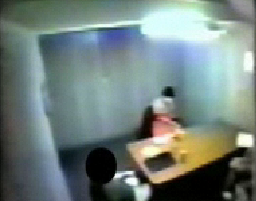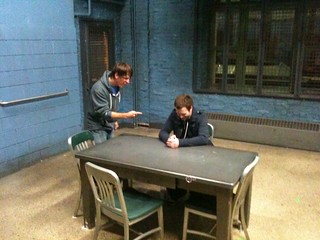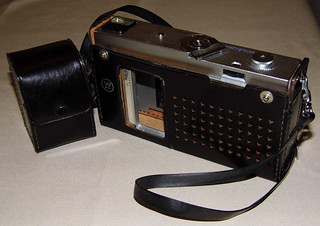| detective (Photo credit: olarte.ollie) |
Today, I have a some questions for you about the interrogation process. I was watching a movie last night where the arresting officer was the one who conducted the interrogation - is that the norm?
Sgt. Pacifico -
Well, that depends. Was the "arresting officer" as you called him a uniformed police officer who knew nothing about the case and just picked the guy up at someone's request or maybe a warrant? Or was he the one who had conducted the investigation?
Fiona-
In this case, he was on patrol, witnessed the crime, and made the arrest. Can you help me understand why you're making a distinction in your question?
Sgt. Pacifico -
Sure. First, let me say that in the scenario you posed, yes he would conduct the interview. Here is how (in most places and agencies) it works. Contrary to television, the vast majority of interviews and interrogations conducted on a daily basis throughout law enforcement are done by uniformed patrol officers.
Sgt. Pacifico -
Well, that depends. Was the "arresting officer" as you called him a uniformed police officer who knew nothing about the case and just picked the guy up at someone's request or maybe a warrant? Or was he the one who had conducted the investigation?
Fiona-
In this case, he was on patrol, witnessed the crime, and made the arrest. Can you help me understand why you're making a distinction in your question?
Sgt. Pacifico -
Sure. First, let me say that in the scenario you posed, yes he would conduct the interview. Here is how (in most places and agencies) it works. Contrary to television, the vast majority of interviews and interrogations conducted on a daily basis throughout law enforcement are done by uniformed patrol officers.
Although the best interrogators are often displayed as detectives -and this is often true - there are far more interrogations and inteviews happening in the uniformed ranks.
Detectives don't steal cases from patrol officers and start interrogating a suspect without knowing the case very well and having done some of their own work on it. Just like the FBI doesn't come in with their hands on their hips and take cases away from local police departments.
| English: Omar Khadr is interrogated by two Canadians (faces obscured) while a female CIA agent oversees. (Photo credit: Wikipedia) |
A detective will conduct an interrogation of a suspect after he has been assigned the case through an administrative process, or if it is the natural assumption of the major case in progress that detectives respond to from the very beginning. In the natural order of things, as the police officers are no longer needed at the scene, they are relinquished back to handling calls in the field.
Something to consider, if we had complete control over the investigation process, the very last action we want to take is to interrogate the suspect. Often that is done very early in a case both in real life and also in fiction. But it is a mistake.
Now the reality is, sometimes we don't even know our suspect is our suspect when we first talk to them. We may think he is a witness....we just don't know either way. I hated it when my suspects would be put in my lap at the early stages of the investigation, and I didn't have enough knowledge to interrogate properly. Asking questions to which we don't know the answer is a dangerous area to be in.
Something to consider, if we had complete control over the investigation process, the very last action we want to take is to interrogate the suspect. Often that is done very early in a case both in real life and also in fiction. But it is a mistake.
Now the reality is, sometimes we don't even know our suspect is our suspect when we first talk to them. We may think he is a witness....we just don't know either way. I hated it when my suspects would be put in my lap at the early stages of the investigation, and I didn't have enough knowledge to interrogate properly. Asking questions to which we don't know the answer is a dangerous area to be in.
Fiona -
At what level of concern will a case require a detective to join the team?
Sgt. Pacifico -
Detectives get involved in cases for a couple of different reasons. Most often it is a manpower issue. The detective doesn't need to fly off to some other call and can spend all day, or the next three days or intermittently the next three weeks working the case. Patrol officers have to field numerous calls every day and be as available as possible for dealing with emergencies - domestic fights, bar fights, traffic crashes, fires, medical emergency calls (we are sometimes the closest unit to a medical call) and any other 911 you can think of.
So if we have a major case brewing that is going to require a lot of coordination, follow-up and by its nature is too enormous for patrol to handle, then detectives are requested by the field supervisor. In most cases this is a sergeant. But then there are those cases which naturally get detective calls without any further ado: homicide, severe crimes against children, some rapes, bomb and arson cases for sure, and some serious assaults
Fiona -
Fiona -
Some rapes?
Sgt Pacifico -
| Me grilling Dan McD in Law & Order SVU's interrogation room (my buddy MikeC works on the show and let us look around the set!) (Photo credit: dpstyles™) |
A basic investigation might include a date rape. Here a friend/acquaintance or family member is the suspect. The location is accessible. And, there is easily obtainable evidence because it was the victim's or suspect's residence. Also, all involved parties are local and available. A good patrol cop will handle this.
A stranger rape, unknown suspect with extreme violence, a crappy outdoor and contaminated scene or a late reported case where evidence is lost...that is going to need a heck of lot more work and a detective will likely spend weeks if not months on it.
Remember, detectives don't just materialize from no where as super interrogators. It's those great street cops that we promote to detective. On Friday, he was a street patrol officer; but come Saturday morning, his orders are effective, and he is now officially a detective. The only thing that changed was his clothing
Fiona-
Thank you for clarifying. I feel better.
How might early interrogation or interviews interrupt a good outcome - good meaning finding the guilty person and removing them from society?
Sgt Pacifico -
Well, the interruption of getting a suspect too early is that without any evidence to provide the investigator with confidence he is the person, it takes a lot of the power of the performance away from the interrogation. That is part of the preparation. Knowing what we know that only the suspect and cops could know. Having some form of proof of his involvement, OR having such knowledge of something that we know we can bluff him with evidence that doesn't exist, but he would believe does exist. That is a whole discussion on themes that we will engage in the future.
Fiona -
Okay so let's say the crime is one of the one's you listed earlier. The police chief wants to put his crack, A+ detective on the scent. What does the detective do prior to entering the interrogation room? (Besides making sure he had an in and out burger a bathroom break and a cig)?
Fiona-
Thank you for clarifying. I feel better.
How might early interrogation or interviews interrupt a good outcome - good meaning finding the guilty person and removing them from society?
Sgt Pacifico -
Well, the interruption of getting a suspect too early is that without any evidence to provide the investigator with confidence he is the person, it takes a lot of the power of the performance away from the interrogation. That is part of the preparation. Knowing what we know that only the suspect and cops could know. Having some form of proof of his involvement, OR having such knowledge of something that we know we can bluff him with evidence that doesn't exist, but he would believe does exist. That is a whole discussion on themes that we will engage in the future.
Fiona -
Okay so let's say the crime is one of the one's you listed earlier. The police chief wants to put his crack, A+ detective on the scent. What does the detective do prior to entering the interrogation room? (Besides making sure he had an in and out burger a bathroom break and a cig)?
Sgt. Pacifico -
| Interrogation (255/365) (Photo credit: andrewrennie) |
If a detective is involved in the case at the late hour and was not part of the investigation and now being brought in, he will indeed make sure about the food, water and bathroom and then he will sit down with the investigating officers and get completely briefed on the case. That could take 10 minutes to the better part of an hour. Hence, the In-N-Out Burger is vitally important to obtaining rapport after the detective enters. (And thanks for reminding me that I'm hungry...)
A good detective will also go over the suspects rap sheet and any written information on the suspects history available. It is in these little bits of history and truths that we know that we can use to test a suspects honesty.
We want to know as much about a suspect as we can before entering the room to give us an edge.
Lastly, we need to determine his status. Is he indeed in custody or did he come voluntarily? If he came voluntarily, did he ride in a cop car? If so was he handcuffed? In the cage portion or up front? All these things matter - they help determine the potential defense issues as to whether or not there was defacto custody or not. Bottom line, do we need to do Miranda or not based on the current set of circumstances.
Fiona -
Now that our detective is up to speed. How does he build the all important rapport necessary to get a confession? Also, concerning Miranda - will the detective who comes in read the miranda rights just to CYA?
Sgt. Pacifico -
No, with Miranda warnings, we don't automatically read them like on television. If he is NOT in custody we do not need to advise him of his constitutional rights per the Miranda decision if we are NOT going to ask him questions against his self interest or regarding information related to the case in chief.
Sgt. Pacifico -
No, with Miranda warnings, we don't automatically read them like on television. If he is NOT in custody we do not need to advise him of his constitutional rights per the Miranda decision if we are NOT going to ask him questions against his self interest or regarding information related to the case in chief.
As part of the rapport building phase, like in any interview including a hiring one, there is usually chit-chat to break the ice. The cops and crook are strangers to each other most often, and there is a need to get to know each other. So we talk about what I call "sports and horses."
However, before we ask any questions that could illicit an incriminating response AND we plan on keeping him now in custody, then we will need to advise him of Miranda. If though, we are going to let him go regardless of what he confesses to, then we don't have to do a miranda warning. But see, now we are getting back to our previous Miranda discussion. Like I said, there are a bunch of variables to Miranda situations that takes hours and days to discuss and learn.
Fiona -
What might a sports and horses discussion look like - "Hi, I'm Sgt Pacifco. I'd like to put your butt in jail for the rest of you life - hey, did you catch the Nicks' game?
Sgt. Pacifico -
Well, cut out the first part, and you got it right. "Hey there, I'm Derek, this funny looking, lanky guy over here is my partner Rick. Don't mind his gawdawful tie, his wife is out of town and didn't lay out his clothes for him this morning. You get something to eat? You gotta piss?"
However, before we ask any questions that could illicit an incriminating response AND we plan on keeping him now in custody, then we will need to advise him of Miranda. If though, we are going to let him go regardless of what he confesses to, then we don't have to do a miranda warning. But see, now we are getting back to our previous Miranda discussion. Like I said, there are a bunch of variables to Miranda situations that takes hours and days to discuss and learn.
Fiona -
What might a sports and horses discussion look like - "Hi, I'm Sgt Pacifco. I'd like to put your butt in jail for the rest of you life - hey, did you catch the Nicks' game?
Sgt. Pacifico -
Well, cut out the first part, and you got it right. "Hey there, I'm Derek, this funny looking, lanky guy over here is my partner Rick. Don't mind his gawdawful tie, his wife is out of town and didn't lay out his clothes for him this morning. You get something to eat? You gotta piss?"
And it goes on from there - "You a baseball fan? Me too. Can you believe Jeter is retiring? I'm kinda glad. He should go out on top. Don't want to see him stay past his abilities. I'll bet he'll be on the networks doing commentary before next spring training." And away we go.... maybe for a half-hour, a full hour.
Then using the prep work, we ask some questions we know the answer to in order to establishing his truth telling style, his truth baseline. Even a mass murdered isn't going to come in and lie about their hobbies, the weather and conversational stuff. Knowing what his full legal name is, we will still ask him to tell is his name. We want to see where that takes us. If his legal name is William Mark Smith, and you call him Will, William or Bill only to find out he hates his first name and goes by Mark, then you have started on a hated foot.
Fiona -
So whether you like it or not - you have to read the sports page.
Sgt. Pacifico -
No, you don't need to read the sports pages. For many years I didn't know enough about sports and really still don't - only baseball. As my son got more involved in playing, we started watching it more. That's why the sports and horses comment. I once had this 15 year old female murder suspect who was neither sport, music, or artfully aware of the world, but she loved horses. Fortunately, I finally found something to talk to her about. Having some knowledge of horses from a summer I spent with some folks who had a horse ranch, I knew enough to ask my suspect questions and have some conversation about something she liked that broke the ice and allowed us to have a meaningful conversation. All the while, I'm reading her facial expressions and body language as it related to something she was comfortable speaking about.
Fiona -
This is very helpful information - obviously the interview process is key. I'm looking forward to your next visit so we can continue learning some of the tricks of the trade. In the mean time, can you tell me how things are shaping up for the Writers' Homicide School? I bet your novelists are compiling their lists of questions to bombard you with.
Then using the prep work, we ask some questions we know the answer to in order to establishing his truth telling style, his truth baseline. Even a mass murdered isn't going to come in and lie about their hobbies, the weather and conversational stuff. Knowing what his full legal name is, we will still ask him to tell is his name. We want to see where that takes us. If his legal name is William Mark Smith, and you call him Will, William or Bill only to find out he hates his first name and goes by Mark, then you have started on a hated foot.
Fiona -
So whether you like it or not - you have to read the sports page.
Sgt. Pacifico -
No, you don't need to read the sports pages. For many years I didn't know enough about sports and really still don't - only baseball. As my son got more involved in playing, we started watching it more. That's why the sports and horses comment. I once had this 15 year old female murder suspect who was neither sport, music, or artfully aware of the world, but she loved horses. Fortunately, I finally found something to talk to her about. Having some knowledge of horses from a summer I spent with some folks who had a horse ranch, I knew enough to ask my suspect questions and have some conversation about something she liked that broke the ice and allowed us to have a meaningful conversation. All the while, I'm reading her facial expressions and body language as it related to something she was comfortable speaking about.
Fiona -
This is very helpful information - obviously the interview process is key. I'm looking forward to your next visit so we can continue learning some of the tricks of the trade. In the mean time, can you tell me how things are shaping up for the Writers' Homicide School? I bet your novelists are compiling their lists of questions to bombard you with.
 |
| click HERE |
Sgt. Pacifico -
I look forward to it as well! The Writers Homicide School is having its next session on June 9-10 in Las Vegas, Nevada. We have writers coming in from as far away as Australia and Canada. Registrations are on sale now, but we will be closing off ticket sales pretty soon so the crowd isn't too big to handle. So if you want to get a ticket, you'd better get in soon. We have a variety of packages available at THIS LINK
P.S. If you found this blog article helpful, you might also want to read these other ThrillWriting articles featuring Sgt. Derek Pacifico:

















